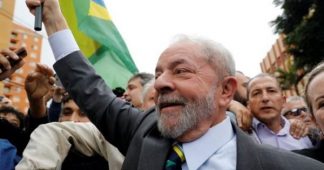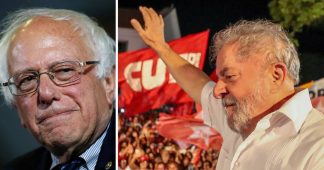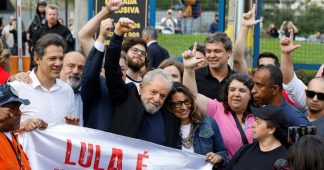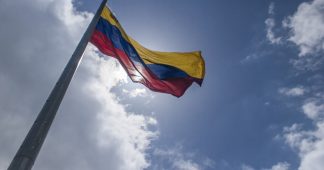By Yunus Soner
With contribution from Douglas Bolivar, Caracas, Venezuela
May 5, 2022
“We cannot depend on the US dollar. We will reestablish relations our relations with Latin America. And we will establish a common currency in Latin America.”
This statement belongs to Luiz Inácio Lula da Silva. Lula has been President of Brazil between 2003 and 2011. He is expected to announce his official candidacy for the Workers’ Party-led coalition for the upcoming elections in October on May 7. He is already leading by a huge margin over the current President and his competitor, Jair Bolsonaro.
Lula has made the statement recently on the electoral congress of the Party for Socialism and Liberty that supports his candidacy. Thousands of party militants have attended his speech.
Lula’s electoral program has not been completed yet, but his statement gives further weight to this proposal first made by Gabriel Galípolo and Fernando Haddad. Galípolo is former President of the Fator Bank, Haddad was Minister in Lula’s cabinet between 2005 and 2012, and the Workers’ Party’s presidential candidate in the elections of 2018, where he was defeated by Bolsonaro.
South American Central Bank
Both contribute actively to Lula’s electoral program and have published an article in the Brazilian newspaper Folha de Sao Paolo on April 1. The authors propose the establishment of a South American Central Bank, which would issue the common digital currency by an initial capitalization by member states. They propose to name it SUR – “south” in Spanish.
Galípolo and Haddad argue that with SUR, Latin American countries could successfully respond to crises stemming from US monetary policies and advance the economic integration of the region.
Former Venezuelan Minister for Economy greets the proposal – and reminds former experiences
Speaking to UWI, Ramón Lobo “greets the proposal of a common currency”, Lobo is President of the Commission for Finance in the Venezuelan National Assembly and former Minister for Economy and Finance. “Latin America has a fundamental need to create an own denominated currency that we ourselves omit”, he says.
Lobo reminds that under the Presidency of Hugo Chavez, Venezuela had started a similar initiative with the introduction of the currency Sucre and the establishment of the Banco del Sur and Banco del Alba. “These established a payment system between regional countries that left the US dollar aside”, he says.
This currency was called the Sucre, and was adopted in 2009 by Venezuela, Nicaragua, Cuba, Bolivia, and Ecuador. At its peak in 2012, the Sucre was used for more than $1 billion in bilateral annual trade in the region.
But the currency fell out of use by 2016, following Chávez’s death in 2013, a massive drop in commodity prices in 2014, the imposition of US sanctions on Venezuela in 2015, and violent coup attempts against Chávez’s successor Nicolás Maduro.
“Brazil is the main economy on the continent. If they join such an initiative, the conditions to be successful will be much better”, adds Lobo who emphasizes that a need for an international payment mechanism has grown due to political interventions into the current SWIFT system.
Brazil’s economy makes one third of Latin American GDP
Indeed makes Brazil’s economy approximately one third of all Latin America, according to World Bank data. In 2020, whole Latin American continent’s GDP was 4.73 trillion US dollars, while Brazil’s economy produced a GDP of 1.44 trillion US dollars. And there are indications that a broader consensus prevails inside Brazil for Lula’s proposal.
In August 2021, current Minister of Economy Paulo Guedes had stated that a united currency for the MERCOSUR would permit a better integration. This currency would be “one of 5 or 6 main relevant currencies in the world”, said Guedes.
In that context, Fernando Esteche, professor for international relations at the Buenos Aires’ La Plata University, points to the alliance that Lula has established with former president Fernando Enrique Cardoso, Geraldo Alckmin and certain productive sectors of the Brazilian economy.
Esteche: “Latin America needs to think on how to disconnect from declining US dollar”
Speaking to UWI, Esteche emphasizes that Latin America has to think on “how to disconnect from the US dollar, which has accelerated its decline since the Ukraine war”. Whether Lula and his alliance can “reactivate the BRICS with a certain autonomy” is the main question that Esteche poses. “In the very short-term, I don’t see the necessary geopolitical conditions as given”, he says.
Walter Sorrentino, National Deputy Chairman and Secretary of International Relations of the Communist Party of Brazil, in coalition with Lula’s Workers’ Party, is more optimistic.
Brazilian Communist Party leader Sorrentino: trading in currencies other than the US dollar is a “form of sovereignty”
Speaking to UWI, Sorrentino says: “The world is changing rapidly. The trend towards multipolarity becomes very clear. This drives nation states to open paths to assert their own interests. In the case of currencies, this is decisive, although it is a matter of long maturation. The formation of economic blocs that can trade with currencies other than the US dollar is a form of sovereignty. On this way, the South American block can reaffirmed. Lula understands the objectively counter-hegemonic sense that the sovereign development of Brazil and our neighbors has. We have greeted Lula for this position.”
Another pressure on the role evolves meanwhile from the US itself: facing already high inflation rates further accelerated by the Ukraine conflict and sanctions against Russia, the US Federal Reserve has started to raise interest rates and a tightening monetary policy.
Galípolo and Haddad meanwhile remind in their article that in 1979, rising US interest rates had brought many countries – including Brazil – in a situation of insolvency. The Brazilian central bank reacted to the FED decision by raising its own lending rate.
A decoupling from the US dollar and the introduction of the SUR may become for Brazil a matter of avoiding economic contraction as well.
Published at uwidata.com
We remind our readers that publication of articles on our site does not mean that we agree with what is written. Our policy is to publish anything which we consider of interest, so as to assist our readers in forming their opinions. Sometimes we even publish articles with which we totally disagree, since we believe it is important for our readers to be informed on as wide a spectrum of views as possible.










